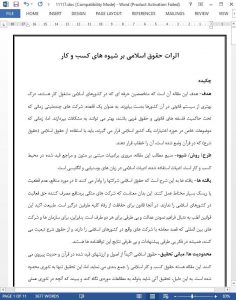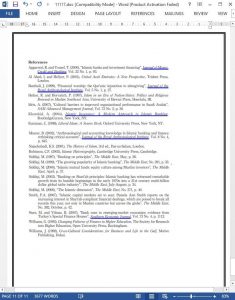Abstract
Purpose The purpose of this paper is to give professionals working in Islamic countries a better understanding of the legal system in those countries. As a rule, multinational companies are more equipped in dealing with problems when governed by Western legal philosophies and jurisprudence. However, when certain issues fall on the jurisdiction of an Islamic country they have to address it by using the Islamic laws (Shariah laws) maintained in the Qur'an.
Design/methodology/approach The source of material for this paper is literature review based on texts and references sourced in the business environment. The literature used is Islamic literature in the Bosnian and English languages.
Findings The findings are that Islamic laws compel companies to be wary of interest, uncertainty or risk. This means that companies that rely on compelling interest on the consumer are prohibited in operating in Islamic states. The law is there to protect the welfare of all the parties involved. The strict nature of these laws often seeks to provide justice and fairness to both parties. Thus, for organisations and international companies who intend to deal with companies based in Islamic countries and adhere to Shariah law should always be mindful of the fairness of their offers and the fairness of the outcomes of these agreements.
Research limitations/implications Islamic laws tend to adhere strictly on the principles and values intimated in the Qur'an and Hadith. This paper summaries the core of Islamic business laws. However, this research is limited to theory alone. For this reason, future research perhaps could look at case studies and see if what works in theory indeed does work in practice too. The review has been limited to Bosnian and English language texts. In addition, this paper has some limited literature review on such a complicated and sensitive topic.
Originality/value This paper will provide important business factors that will essentially assist international businesses in their understanding of the legal standards in this region. Keywords
Introduction
Islam has been considered as perhaps one of the oldest religions in the world, and notably it has acquired a significant number of followers (Najeebabadi, 2001). In the Middle East, some countries such as the United Arab Emirates (UAE) adhere to Islamic customs. Simultaneously, the UAE implements the laws on which the Qur’an commands “Allah has made business lawful for you” (Qur’an 2:275). Since Islamic laws are implemented this means that the UAE implements its own set of laws which is considerably distinct to the other jurisprudence in other Arabic states (Williams, 1992). Normally, multinational companies are more equipped in dealing with problems when governed by western legal philosophies and jurisprudence. However, when certain issues fall under the jurisdiction of an Islamic country they have to address it by using the Shariah laws maintained in the Qur’an.
Conclusion
The intended goal of this paper is to give professionals working in Islamic countries a review of the key factors influencing business transactions in Islamic countries. Through this it is hoped that a better understanding of the legal system operating in those countries can be gained. Better business relationships are likely to develop if western companies appreciate the key factors in doing business in Islamic countries. The rules are often not more onerous, but introduce universal concepts of fairness and transparency into the practices and relationships between buyer and seller or provider and receiver of services. As a rule, multinational companies are better equipped in dealing with problems when governed by western legal philosophies and jurisprudence. However, when certain issues fall on the jurisdiction of an Islamic country they have to address it by using the Islamic laws (Shariah laws) defined in the Qur’an









